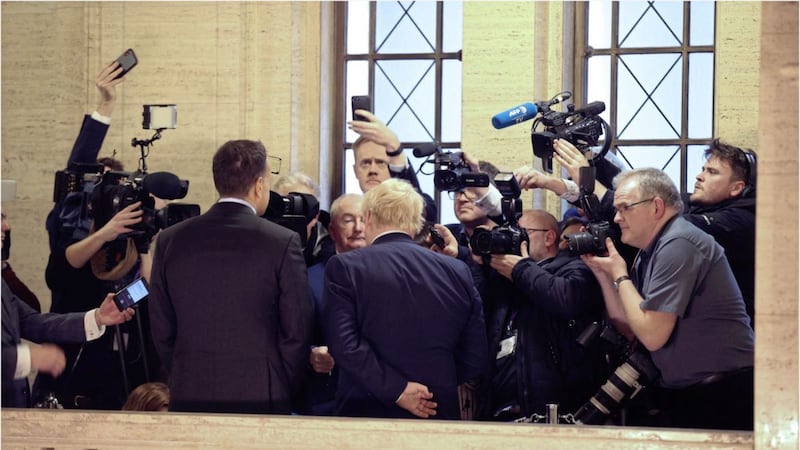Less than 48 hours after Julian Smith and Simon Coveney stood in the freezing cold under the shadow of Lord Carson and announced their agreement, the executive and assembly had been rebooted. It's the fastest I've seen any of them move for years.
Whether it will all end in cheers or tears is anyone's guess at the moment, but it just goes to show what the DUP and Sinn Féin will do to avoid an election.
It has been obvious since the general election that the DUP, Sinn Féin, UUP and SDLP would be wary of an election; and that made the job of the two governments very much easier. I'm not sure that strike action by nurses was as significant a factor as some people think, but it certainly gave Arlene Foster and Michelle O'Neill a useful hook upon which to hang a cynical and certainly very belated claim to be 'listening to what people have been telling us on the doorstep."
My own instinct is that an awful lot of people would actually have welcomed the opportunity to give their verdict on the assembly and the issues they believed the parties should prioritise; yet the speed with which the big two parties said yes to the agreement (less than an hour in the DUP's case) suggests they've heard more than enough from the electorate in the last six months.
If the parties were expecting a happy-clappy response from the general public and the media they were sorely disappointed. The loudest sound wafting towards Stormont on Saturday morning was a collective, 'about bloody time, now don't make another dog's dinner of it.' And that's probably the most important thing the parties need to take on board: the vast majority of people aren't really expecting this latest executive to make a real difference to their everyday lives and most of them would, if asked about the likelihood of progress, respond with a shrug of the shoulders and a fairly unconvincing, "Well, I hope so."
This is not April/May 1998. And nor is it May 2007. We've all been here before and we've all been let down before. It will take a lot - and I really do mean a lot - to persuade us that it will be different this time. And we've already seen some of the early signs of slippage. The DUP and Sinn Féin cooking up their own 'ourselves alone' deal to ensure Alex Maskey as Speaker rather than the SDLP's Patsy McGlone; Sinn Féin junior minister Declan Kearney describing the new agreement as '..a landmark opportunity, a beachhead..towards Irish unity'; and Edwin Poots hinting at water rates and earning an immediate 'no way' response from Michelle O'Neill. This is the sort of make-it-up-as-you-go-along stuff that did so much damage in the past.
I'm concerned, too, that with 85 of the MLAs members of executive parties it will make scrutiny very difficult. Some of them have trotted out the old line about being able to 'provide better scrutiny from inside rather than outside,' but that approach didn't work all that well between 2007 and 2016, when the UUP and SDLP opted for opposition. Again, we've already seen and heard some grumbling from the parties about decisions taken by ministerial announcements from other parties. This is not going to work unless they take collective responsibility for a Programme for Government and defend it collectively. The facade of being in the executive while insisting they can publicly object to the bits of stuff they don't like will, as it did many times in previous executives, cause major problems.
The fact that Julian Smith seems to have pulled the wool over their eyes (the trademark practice of a former Chief Whip, I would have thought) re financing key elements of the agreement hasn't helped; although the additional fact that he seems to have known he would get away with it is very instructive. Whisper it, but I quite like the guy. It's about time we had a secretary of state who didn't fawn over politicians who have grown needy and arrogant after three decades of being fawned over by successive occupants of Hillsborough Castle. They need to take responsibility for the government they have agreed to form with each other.
Anyway, in that awful old phrase, we are where we are. Sadly, I've no idea if that is a good or a bad thing.








